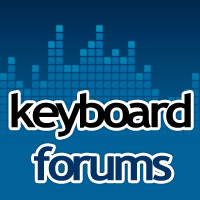- Joined
- Oct 11, 2022
- Messages
- 12
- Reaction score
- 2
So, my first keyboard (Yamaha PSr-373, 61 key) is due to arrive tomorrow.
As a complete newbie on keys I have absolutely no idea where to start. Scales. Learn some easy songs, chords? How about finger positions? Is there a standard (as there generally is for guitar chords) or should I just go with what comes naturally?
Does anyone have any recommendations for an online beginners course or something? I will probably be better following something like that - as one problem I had with guitar was that I literally just piddled around with loads of stuff - like learnt a riff, then jumped to something else without learning the entire song etc. (Youtube syndrome or maybe a bit of ADHD, lol)
I have had a quick look around on this forum and found that thread from 2013 but again I would not know where to start with all the stuff posted on there, no matter how useful.
How about sight reading? - should I start the long process on that. On guitar I was a tab man only and looking at youtube videos it seems the keyboard version of that are those scrolling (guitar hero style) keys videos. Not sure if that is the best way to learn to play. Though at the same time, unless I get books I doubt I will be seeing much sheet music on the internet.
Arrgghh. Help.
As a complete newbie on keys I have absolutely no idea where to start. Scales. Learn some easy songs, chords? How about finger positions? Is there a standard (as there generally is for guitar chords) or should I just go with what comes naturally?
Does anyone have any recommendations for an online beginners course or something? I will probably be better following something like that - as one problem I had with guitar was that I literally just piddled around with loads of stuff - like learnt a riff, then jumped to something else without learning the entire song etc. (Youtube syndrome or maybe a bit of ADHD, lol)
I have had a quick look around on this forum and found that thread from 2013 but again I would not know where to start with all the stuff posted on there, no matter how useful.
How about sight reading? - should I start the long process on that. On guitar I was a tab man only and looking at youtube videos it seems the keyboard version of that are those scrolling (guitar hero style) keys videos. Not sure if that is the best way to learn to play. Though at the same time, unless I get books I doubt I will be seeing much sheet music on the internet.
Arrgghh. Help.

